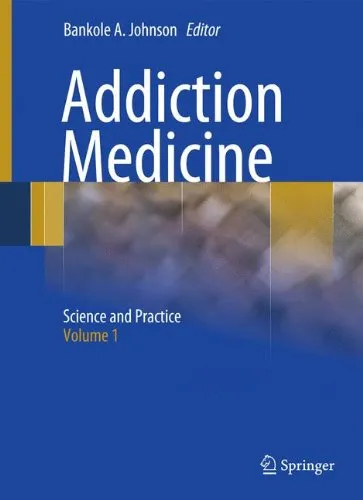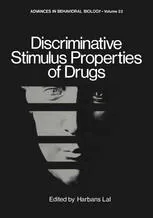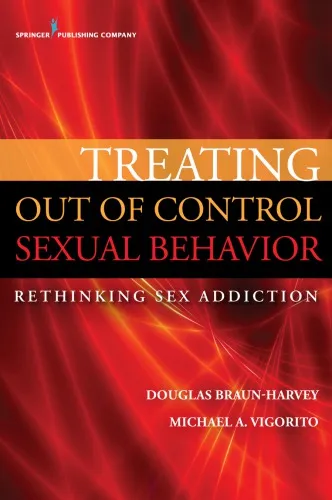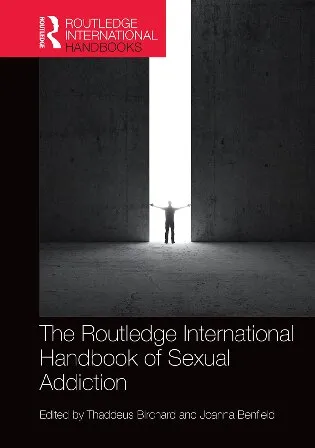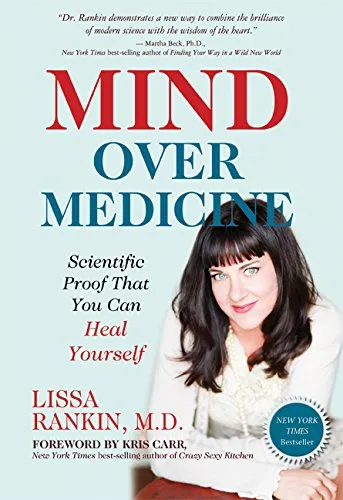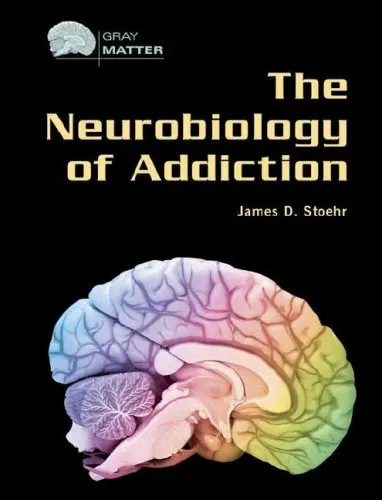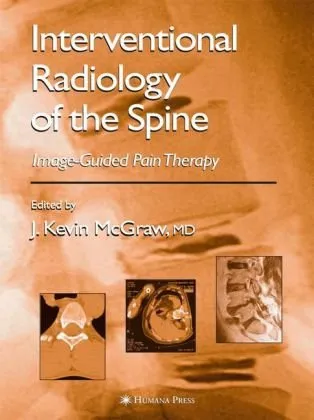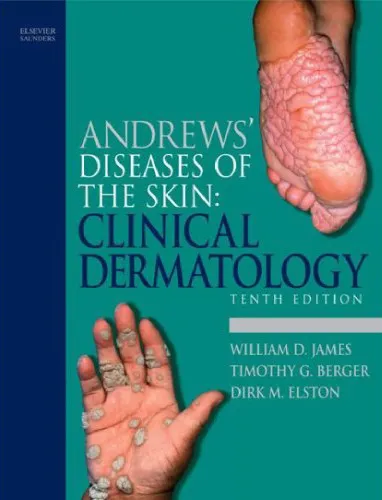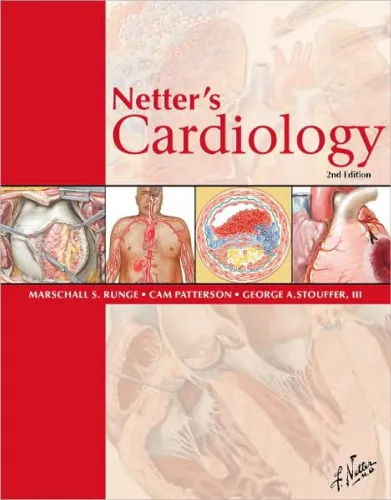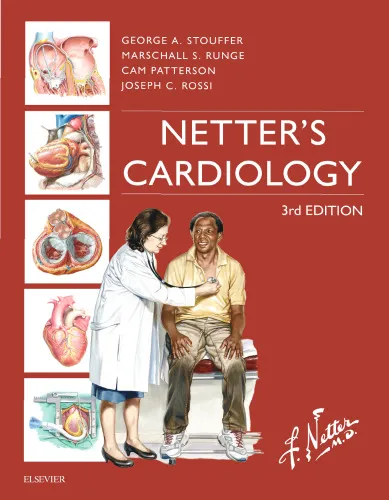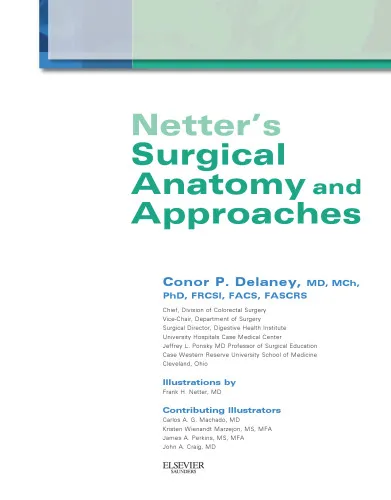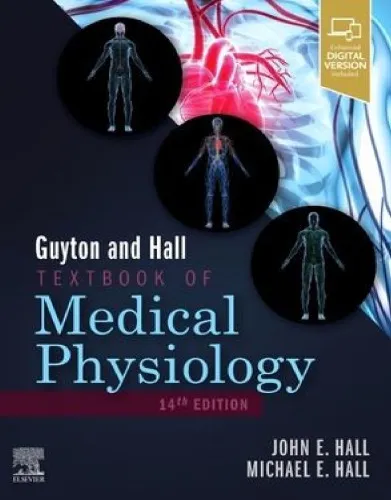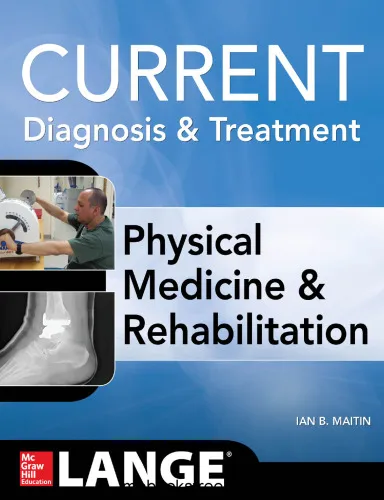Addiction Medicine: Science and Practice
4.5
بر اساس نظر کاربران

شما میتونید سوالاتتون در باره کتاب رو از هوش مصنوعیش بعد از ورود بپرسید
هر دانلود یا پرسش از هوش مصنوعی 2 امتیاز لازم دارد، برای بدست آوردن امتیاز رایگان، به صفحه ی راهنمای امتیازات سر بزنید و یک سری کار ارزشمند انجام بدینکتاب های مرتبط:
معرفی کتاب "Addiction Medicine: Science and Practice"
کتاب Addiction Medicine: Science and Practice یکی از منابع تخصصی و جامع در زمینه اعتیاد است که توسط H. Westley Clark و Linda Hutchings تألیف شده و Bankole A. Johnson ویراستار آن میباشد. این اثر یک مطالعه بینرشتهای در مورد پدیده پیچیده اعتیاد ارائه میدهد و همزمان به علوم زیستی، رفتاری، و اجتماعی پرداخته است. هدف اصلی این کتاب تحلیل علمی اعتیاد، روشهای درمان، و تأثیرات این بیماری بر فرد و جامعه است.
خلاصهای جامع از کتاب
در این کتاب، جنبههای مختلف فیزیولوژیکی، روانشناسی و اجتماعی اعتیاد بررسی میشود. فصول ابتدایی به تعریف اعتیاد و مکانیسمهای زیستی مرتبط با آن مانند اختلال عملکرد Neurotransmitter و نقش Dopamine Pathways میپردازند. در ادامه، موضوعاتی مانند درمانهای مبتنی بر شواهد (Evidence-Based Treatments) و مداخلات رفتاری مورد بحث قرار میگیرد. نویسندگان همچنین تأثیر مواد مختلف شامل الکل، مواد مخدر، و مواد محرک را بر مغز و رفتار انسان تحلیل کرده و به آثار بلندمدت سوءمصرف مواد بر سلامت جسمی و روانی توجه میکنند.
یکی از بخشهای برجسته کتاب، ارائه چارچوبی برای پیشگیری و درمان است که شامل استفاده از تکنیکهای Motivational Interviewing و درمانهای دارویی مانند استفاده از Methadone یا Buprenorphine میباشد. همچنین، چالشهای پیادهسازی درمان در محیطهای بالینی و راهکارهای کاهش انگ اجتماعی درباره اعتیاد نیز بهطور مفصل شرح داده شدهاند.
نکات کلیدی کتاب
- تبیین علمی و روانشناختی سازوکارهای نوروبیولوژیکی اعتیاد.
- روشهای متنوع و مدرن درمانی شامل بهکارگیری Cognitive Behavioral Therapy (CBT) و درمانهای مبتنی بر دارو.
- بررسی عواملی که باعث آسیبپذیری بیشتر برخی افراد نسبت به اعتیاد میشود، شامل ژنتیک و تأثیرات محیطی.
- تحلیل اثرات اجتماعی و روانی اعتیاد بر خانوادهها و جوامع.
- استراتژیهای پیشگیری و نقش آموزش در کاهش شیوع اعتیاد.
جملات معروف از کتاب
"Addiction is not merely a failure of willpower; it is a chronic disease of the brain."
"Effective treatment begins with an understanding of the biology of addiction."
"Recovery is possible but requires commitment, support, and a comprehensive care plan."
چرا این کتاب اهمیت دارد؟
کتاب Addiction Medicine: Science and Practice یک منبع بیبدیل برای دانشجویان، پزشکان و متخصصان حوزه سلامت است که به دنبال درک عمیقتری از اعتیاد و راهبردهای مقابله با آن هستند. این کتاب نه تنها دانش علمی فراگیر ارائه میدهد، بلکه به مسائل عملی مانند مداخلات درمانی و اجتماعی نیز میپردازد. در دنیای امروز که سوءمصرف مواد چالشهای فراوانی برای جوامع ایجاد کرده است، ابزارها و اطلاعات موجود در این کتاب به خوانندگان کمک میکند تا راهکارهای مؤثری برای درمان و پیشگیری از اعتیاد بیابند.
با تمرکز بر روشهای Evidence-Based و تأکید بر اهمیت نگاه چندبعدی به پدیده اعتیاد، این کتاب بهعنوان یک راهنمای کامل برای متخصصان در حوزههای مختلف، از پزشکی گرفته تا علوم اجتماعی، نقشی کلیدی ایفا میکند. خواندن این اثر به تمامی افرادی که به سلامت روان و بهبود کیفیت زندگی علاقهمند هستند توصیه میشود.
Introduction to "Addiction Medicine: Science and Practice"
Substance addiction remains one of the most pressing challenges faced by individuals, families, and societies alike. Addressing this multifaceted issue requires a deep understanding of its biological, psychological, and social dimensions. Addiction Medicine: Science and Practice strives to bridge this gap by providing a comprehensive insight into the scientific principles and evidence-based practices of addiction treatment.
This book, edited by Bankole A. Johnson, features contributions from leading experts in the field, combining rigorous academic research with practical clinical strategies. It is an essential resource for clinicians, therapists, researchers, and policymakers who wish to better understand and combat addiction in all its forms. By integrating advancements in neuroscience, pharmacotherapy, and behavioral therapies, this book equips readers with the tools needed to provide effective, compassionate care for individuals struggling with substance use disorders.
Detailed Summary of the Book
The text offers an in-depth exploration of the science and practice of addiction medicine, structured in a manner that caters to professionals from diverse backgrounds. It comprehensively covers the following topics:
- Neuroscience of Addiction: A detailed look at the neurobiological mechanisms underlying addiction, focusing on brain circuits, neurochemistry, and genetic predispositions.
- Pharmacological Treatments: Insightful discussions on existing and emerging pharmacotherapies tailored for specific types of substance abuse, including alcohol, opioids, stimulants, and tobacco.
- Psychotherapeutic Interventions: Evidence-based psychotherapy techniques such as cognitive-behavioral therapy (CBT), motivational interviewing, and contingency management.
- Societal and Cultural Considerations: Examination of the social determinants of addiction, stigma, and the role of public policy in reducing substance-related harm.
- Special Populations: Chapters devoted to addressing addiction in subgroups such as adolescents, women, older adults, and individuals with co-occurring psychiatric conditions.
The book is structured to provide both foundational knowledge and cutting-edge developments, making it useful for seasoned addiction specialists as well as those new to the field. Each chapter is meticulously referenced, making it a reliable basis for further study.
Key Takeaways
- Addiction is a chronic and relapsing brain disease, but it is treatable with a combination of biological, psychological, and social interventions.
- Effective addiction treatment requires addressing both the immediate symptoms of withdrawal and the underlying causes that drive substance use.
- Emerging research in pharmacogenetics and neuroimaging is revolutionizing the field of addiction medicine, promising more personalized and effective therapies.
- Stigma and lack of access to care continue to be significant barriers, and addressing these challenges is key to broadening the scope of treatment.
- Collaboration between disciplines—medicine, psychology, public health, and social work—is essential to achieve the best outcomes for those struggling with addiction.
Famous Quotes from the Book
"Addiction is not merely an individual affliction; it is a societal challenge that demands collective understanding and action."
"Recovery is not a single event but a series of steps guided by science, compassion, and the resilient spirit of those who seek a better future."
"The most effective treatments for addiction address the whole person—body, mind, and context."
Why This Book Matters
Addiction affects millions of people worldwide, yet remains one of the most misunderstood and underdiagnosed conditions. Addiction Medicine: Science and Practice addresses this knowledge gap by offering a balanced, authoritative resource that integrates the latest scientific discoveries with practical applications. This book matters because it empowers caregivers, clinicians, and policymakers to make informed decisions that improve lives and combat one of the most pervasive public health issues of our time.
Furthermore, it acknowledges the complexity of addiction as a biopsychosocial phenomenon, emphasizing the importance of a multidisciplinary approach to treatment. By challenging stigma and advocating for evidence-driven practices, this book contributes to a more compassionate and effective healthcare system.
Whether you are a healthcare professional, a student, or someone personally affected by addiction, Addiction Medicine: Science and Practice is a crucial tool in understanding and addressing this profound issue.
دانلود رایگان مستقیم
شما میتونید سوالاتتون در باره کتاب رو از هوش مصنوعیش بعد از ورود بپرسید
دسترسی به کتابها از طریق پلتفرمهای قانونی و کتابخانههای عمومی نه تنها از حقوق نویسندگان و ناشران حمایت میکند، بلکه به پایداری فرهنگ کتابخوانی نیز کمک میرساند. پیش از دانلود، لحظهای به بررسی این گزینهها فکر کنید.
این کتاب رو در پلتفرم های دیگه ببینید
WorldCat به شما کمک میکنه تا کتاب ها رو در کتابخانه های سراسر دنیا پیدا کنید
امتیازها، نظرات تخصصی و صحبت ها درباره کتاب را در Goodreads ببینید
کتابهای کمیاب یا دست دوم را در AbeBooks پیدا کنید و بخرید
1266
بازدید4.5
امتیاز0
نظر98%
رضایتنظرات:
4.5
بر اساس 0 نظر کاربران
Questions & Answers
Ask questions about this book or help others by answering
No questions yet. Be the first to ask!
